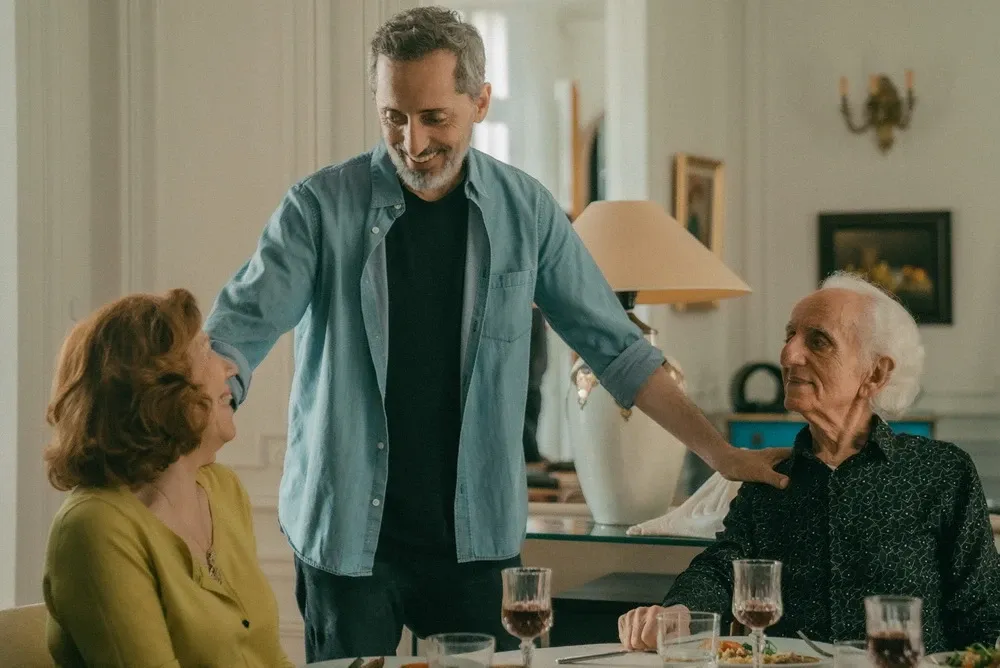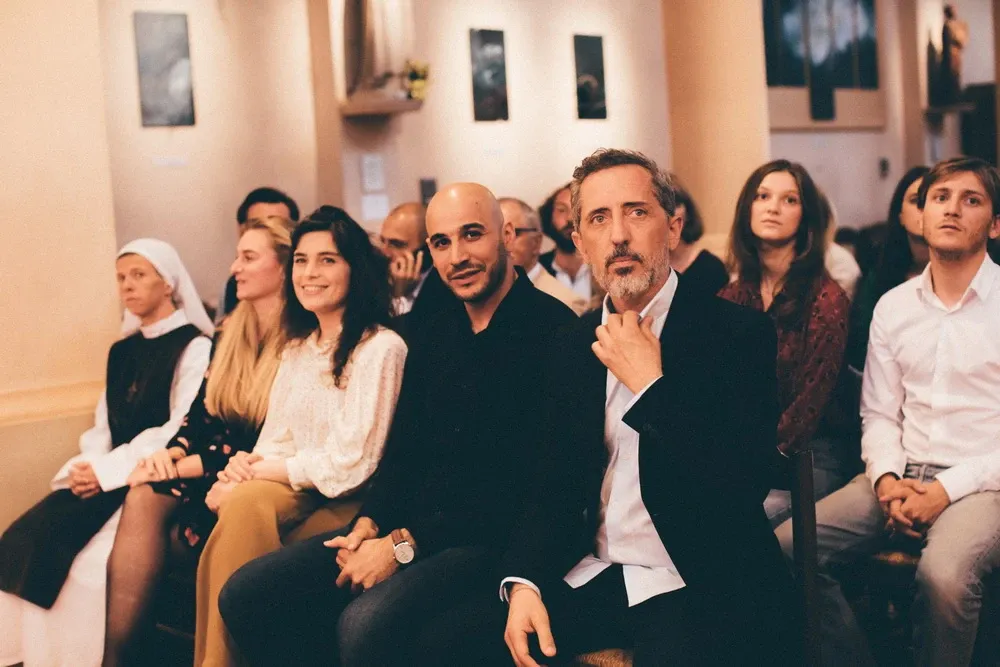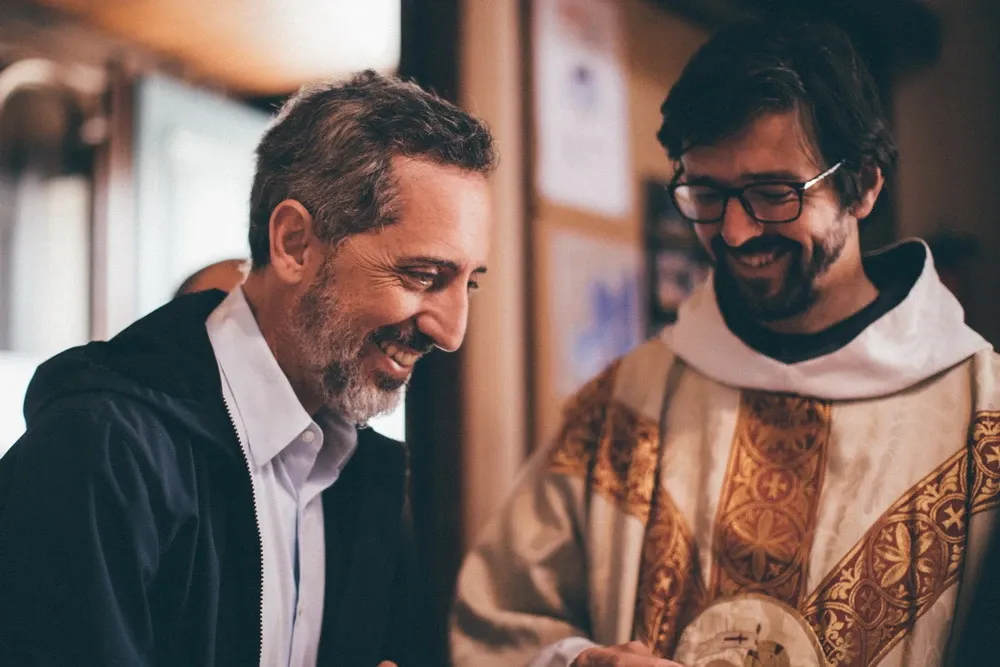Gad Elmaleh takes on a deeply personal project with Stay With Us, a semi-autobiographical film examining his own questions of faith and family. Like Gad, the character he plays finds himself drawn to Catholicism despite coming from a Sephardic Jewish background. This new direction in his spiritual path sparks dramatic tensions as his friends and family struggle to understand his religious transition.
Born in Morocco but raised between Casablanca and Paris, Gad spent much of his youth exploring life’s bigger questions. Coming from a culturally diverse region, he developed an open curiosity about beliefs beyond his own upbringing. This independent spirit served him well as a comedian in both France and America, but now returns him to his roots in unexpected ways.
When Gad visits his parents and sister in Paris, they’re blindsided by news of his upcoming baptism. Knowing it may strain their close bonds, Gad finds the situation growing more complex. As he weighs his personal convictions against group identity and loyalty to his family, difficult choices emerge.
Through this intimate drama, Elmaleh invites reflection on topics of faith, belonging, and the relationships that shape us. By casting his own loved ones and drawing from life experiences, he brings authenticity and nuance and challenges both characters and viewers to understand different perspectives. Stay With Us offers no easy answers but delivers an impactful cinematic conversation on reconciling spirituality and connections to home.
Faith and Family
Gad finds himself at a crossroads when he returns to visit his loved ones in Paris. Living abroad in New York had allowed time for introspection, leading him to feel drawn towards baptism. But breaking this news proves more difficult than he imagined.
Trouble starts as soon as he arrives. While rummaging in his suitcase, Régine comes across a statue of the Virgin Mary tucked inside, revealing her son’s secret plans sooner than he intended. Word quickly reaches the rest of the family, who struggle to understand Gad’s desire to leave Judaism behind.
David and Régine can’t fathom why their child would give up the religion they worked so hard to sustain abroad. Meanwhile, sister Judith worries this spiritual change may damage their close bond. Even their friend Roschdy tries dissuading Gad, feeling he’ll regret abandoning Jewish traditions.
Amid this turmoil, Gad finds support from Priest Nicolas and Nun Catherine. They assure him a place in the Catholic faith, should he choose it. But local Rabbis only add to the family’s doubts with pointed questions about his motives. And within Gad too rises an internal conflict as he ponders the challenges rejecting his roots may bring.
Faced with upsetting those dearest to him or staying true to his heart, God must carefully weigh both religion and relationships in this complex journey of faith.
Identity and Belonging
Gad’s upbringing in Morocco left him with a lifelong curiosity about spirituality. Growing up in Casablanca, he was surrounded by religious diversity, celebrating holidays with both Muslim and Jewish friends. This environment sparked thoughtful questions from a young age. It helped shape his openness to spiritual exploration later in life.
When returning to Paris as an adult, Gad finds himself drawn towards Catholicism. There’s an undeniable attraction and peace he feels in churches that Jewish traditions cannot replace. Yet his roots and upbringing also give him conflict over fully leaving Judaism behind. He loves parts of both religions but belongs completely to neither.
The film avoids providing clear answers. There is no easy resolution to Gad’s dilemma between faiths. Instead, it starts important conversations about struggling with beliefs you did not fully choose yourself. Both Gad and his mother question ideas imposed on them from childhood without examination. They must navigate loyalty to family and community versus staying true to their own evolving spiritual identities.
Overall, Stay With Us expertly explores what it means to balance internal conviction with external expectations. It leaves viewers contemplating their place in the religious and cultural groups that define them but may not fully satisfy their spiritual curiosity or questionings. Some paths forward remain uncertain, as with Gad’s ongoing journey.
Revelations and Reactions
Régine struggles most with Gad’s plans to convert. As his mother, she worries his choice means losing a part of him. Their relationship faces new stresses as Régine clings tightly to her faith. Her reactions, coming from a place of care, only push Gad further from his goal of avoiding family pain.
David’s talk with the Rabbi offers a brighter moment. The wise words, both funny and thought-provoking, start to open David’s eyes. He sees now that faith is a personal matter. A child choosing a different path need not mean rejecting their roots. This changes how David views Gad’s decision, bringing them closer through understanding instead of division.
Keeping secrets strains the whole family. No one wants to cause each other hurt, yet honesty seems the only way forward. Gad holds off confronting his parents as long as he can. But avoiding issues leaves relationships feeling disconnected. By film’s end, open dialogue may begin healing old wounds and forging new bonds of respect amongst them all.
Transforming Through Collaboration
Gad Elmaleh’s venture into directing Stay With Us saw meaningful evolution through his partnership with scriptwriter Benjamin Charbit. Their collaboration nurtured a creative synergy crucial to evolving the film beyond a straightforward narrative. Charbit helped Elmaleh balance the movie’s humorous and serious aspects, resulting in a richly layered exploration of Gad’s spiritual journey.
The film derives great authenticity from casting Elmaleh’s own family and friends in starring roles. Playing versions of themselves, their genuine performances infuse the character’s experiences with organic realism and warmth. This brings audiences into intimate connection with the emotional impacts explored.
Elmaleh’s deft directorial hand balanced the story’s lighter and heavier moments with skill. He cleverly captured the nuanced complexities of a man navigating religious uncertainty. Humor and gravity are both given space, reflecting the multifaceted nature of Gad’s quest for personal meaning.
Composer Ibrahim Maalouf crafted a soundtrack that beautifully enhances the film’s tone. His gentle, evocative score complements the visual narrative. The thoughtful music pairs perfectly with the story, enriching the audience’s engagement with Stay With Us’ reflective themes.
Weaving Truth Through Humor
Stay With Us tackles weighty subject matter through a comedic lens, an approach with potential pitfalls. Its semi-autobiographical comedy format runs the risk of coming across as gimmicky or lacking depth. Developing the film as an extended stage routine centered on jokes risks portraying Gad’s religious crisis insincerely.
However, some poignant scenes hint at deeper truths beneath the humor. A heartfelt discussion between David and his rabbi effectively conveys the father’s fears of loss. Régine also shares raw emotions with a statue of Mary. These moments indicate the capability for sincerity when humor recedes.
The movie could have more directly presented Gad’s spiritual reasoning for converting and candidly shown family negotiations around this. Relying on humor sometimes left important aspects, like the character’s specific motivations, feeling superficial. While comedy acts as an entertaining vessel, the story stands to gain from punctuating it with even greater vulnerability and straightforward discussion of its weighty themes.
A balanced approach integrating humor with candid insights might have ultimately delivered richer character portraits and more meaningful commentary on faith and belonging. Despite risks, the filmmaking team shows glimpses of weaving truth skillfully into their comedic tapestry.
Navigating Faith and Family
The semi-autobiographical comedy format Stay With Us employs carries risks. Developing the film like an extended comedy routine focusing on jokesendangers presenting Gad’s religious crisis and motivation insincerely. There is potential for the story to seem gimmicky or superficial.
However, some impactful scenes cut through any sense of shallowness. The conversation between David and his rabbi effectively conveys the father’s fears. Régine also shares a raw feeling with Mary’s statue. These moments hint at deeper truths beneath the humor.
While comedy serves as an entertaining vehicle, the film may have benefited from being even more forthright. More directly exploring Gad’s specific reasons for converting and candid discussions around his choice could have strengthened the narrative. This approach might have resulted in richer character portraits and commentary on the significant themes of faith, community, and familial belonging.
Balancing humor with candid insight arguably represents a sweet spot worth aiming for. Both types of content have value in a movie grappling with such weighty subject matter in an artful way.
Questions of Faith, Family and Self
Stay With Us concludes by inviting reflection on beliefs that shape us and those we’re closest to. In chronicling Gad’s spiritual exploration, it encourages examining one’s own place of faith or doubt and what we take for granted. The film grapples with how disrupting this equilibrium impacts those relying on the status quo.
While ambitious in aim to sincerely address profound religious change and family ties, execution is occasionally hindered by comedy’s framing. Too often focusing on jokes at the outset muddles conveying Gad’s true motivations and his family’s genuine concerns. More candid conversations may have strengthened viewers relating to their struggles.
Yet thought-provoking scenes cut through any superficiality, poignantly showing shifting parental roles as security dismantles. The movie leaves us pondering life’s pivotal adjustments and our fluid identities. How we connect to others and belong amid turbulence proves complex with resolutions rarely neat.
Overall, Stay With Us sparks meaningful discussion on navigating momentous personal transformations and what endures at our core. By challenging preconceptions of faith and loyalty, it encourages appreciating life’s uncertainties and diversity of experiences, including those differing from our own.
The Review
Stay with Us
While Stay With Us shows ambition in seriously addressing religious transitions and their effects on family, execution is somewhat compromised by an overly comedic tone at the outset that risks shallowness. However, more candid scenes offer thoughtful insights into shifting identities and relationships during life's profound changes. Ultimately, the film leaves lingering questions instead of answers and encourages understanding perspectives other than our own.
PROS
- Ambitious storyline exploring religious conversion and its impact on family dynamics.
- Features compelling scenes that pierce superficial comedy with sincere emotions.
- Provokes meaningful discussion on navigating pivotal life changes and fluid identities.
CONS
- Comedic framing at the outset risks superficiality and obscures character motivations.
- Could have been more candid in conveying real concerns instead of jokes.
- Execution is sometimes undermined by a lighter tone that does not match serious themes.




















































Discussion about this post